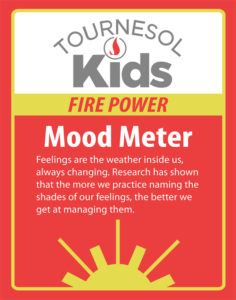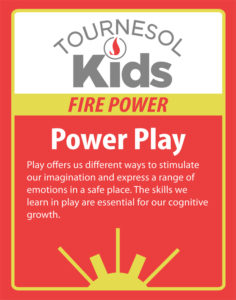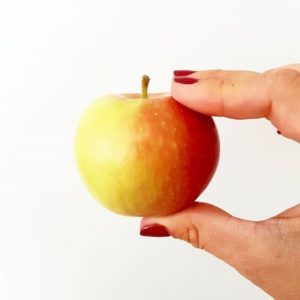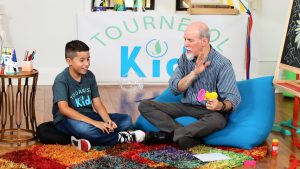 One in seven children aged 2 to 8 has a mental, behavioral or developmental disorder. Overcoming these obstacles requires resilience. We can help kids understand their emotions and deal with the challenges that face them.
One in seven children aged 2 to 8 has a mental, behavioral or developmental disorder. Overcoming these obstacles requires resilience. We can help kids understand their emotions and deal with the challenges that face them.
One of the activities in the Tournesol Kids Game called Mood Meter helps children develop their emotional vocabularies so they can better understand and express their own feelings.
 One in four kids today is anxious. We can help kids deal with their anxiety by accessing the peace that is always available to them when they pause. One of the activities in the Tournesol Kids Game called Pause for Peace gives children a way to reconnect with their inner peace.
One in four kids today is anxious. We can help kids deal with their anxiety by accessing the peace that is always available to them when they pause. One of the activities in the Tournesol Kids Game called Pause for Peace gives children a way to reconnect with their inner peace.
This post originally appeared on the Tony Robbins blog.
The rate of diagnosis of Attention Deficit Hyperactivity Disorder is skyrocketing – in fact, in the United States, more than 10 million school-age children are medicated to help them focus. Is this a real epidemic or a reflection of the pressures of society and our need for quick fixes? The answer is not so straightforward. Team Tony sits down with Dr. Stephen Cowan to discuss his unique holistic approach to evaluating and treating children with symptoms of ADHD using the five-element theory of Chinese medicine.
Team Tony: When it comes to health, there is an increasing trend amongst Americans to opt for a quick fix of “what’s wrong” – if we have a headache, we take a pill to ease the pain. If we can’t sleep, we take a pill to knock us out. The same mentality also applies to how we treat ADHD in children, which you address in your book, Fire Child, Water Child. Tell us a bit about your message and philosophy surrounding ADHD.
Stephen Cowan: Doctors are trained to deal with emergencies quickly and efficiently. There’s nothing wrong with this. In fact, our medical system is one of the best at handling emergencies. The problem is, 99% of suffering is NOT a life-threatening emergency, and when you treat it with quick fixes, it provides at best only temporary relief, and, at worst, it adds to suffering – which ultimately becomes frustrating and dissatisfying for both patient and practitioner.
What I experienced many years ago in my pediatric practice was a deep need to help children and parents find a more fulfilling experience of living, rather than simply running from one emergency to the next. ADHD is a perfect example of this problem. As I wrote in Fire Child, Water Child, ADHD is a symptom, not a disease. Good medicine asks what is it a symptom of, rather than just treating the symptom. Much of my work as a holistic developmental pediatrician these days is focused on empowering parents to grow healthy, resilient children in body, mind and spirit. The basis of this empowerment lies in our ability to connect effectively to the world around us. When disconnected, we see symptoms as bad, making us victims of circumstances. What’s needed is a deeper understanding of our personal style, what we use to connect and adapt to the world or change. I call this our “secret power.”
Team Tony: You say that children have 5 adaptive styles, or certain talents and predispositions that characterize the way they learn from their experiences and deal with the stressors of life. What are those adaptive styles?
Stephen Cowan: I adapted the five-element theory of Chinese philosophy to serve as a guide to parents and children that brings greater self-awareness and teaches them how to effectively grow and share their secret powers with the world. The five powers correspond to five archetypal heroes of creativity: Wood, Fire, Earth, Gold, Water.
The Wood hero has a natural sense of vision, motivated by freedom that seeks challenges in order to encourage others to find their path to fulfillment.
The Fire hero has a natural sense of joy and optimism, motivated by intuition that inspires others to find creativity by looking on the bright side.
The Earth hero has a natural sense of teamwork, motivated by empathy that creates the fulfilment of healthy community with others.
The Gold hero has a natural sense of order, motivated by grace and gratitude that creates the fulfilment of beauty with others.
The Water hero has a natural sense of calm, motivated by introspection, that brings deep meaning of fulfilment to others.
Team Tony: Why is it important for parents to understand their child’s secret power?
Stephen Cowan: This five-phase model becomes a map for healthy living for anyone, especially parents. I find that when parents stay focused on the inner hero within their child, they can problem-solve more effectively because they know exactly what their child needs at any given moment. This is the basis of empathy that transforms their relationship with their child.
Liberated from expecting their child to be just like them, parents begin to understand the fundamental relationships of the five powers, which powers are “hero-helpers” and which are “hero-challengers” for their child. For example, wood feeds fire: this means a child with Fire power is nourished by wood (planning ahead). Water puts out fire which means water (patience) is an important challenger for a Fire child to become a Fire Hero. These insights make parenting much more fun and fulfilling, because when they effectively empower their child, parents themselves are transformed into heroes.
Team Tony: Why is it important for kids to understand their own secret power?
Stephen Cowan: Self-knowing or self-awareness is the key to fulfilment in life. But, if you remember the awkwardness of middle school, the bridge to self-awareness is self-consciousness, the feeling of not quite fitting in. I find the language of the five powers liberates children from the burden of negative labels, diagnoses and judgments. When a child grows up knowing how to grow his or her secret power, a heroic path opens to personal freedom, joy and grace.
Team Tony: This holistic approach to helping children understand their true nature, strengths, and weaknesses would be incredibly beneficial in an academic environment. Is this something that you are implementing in schools?
Stephen Cowan: We created the non-profit Tournesol Kids program to make this holistic perspective accessible to children and teachers in schools because that’s where children spend most of their day. Teachers and kids are under enormous stress these days. I want to enhance their learning experience by offering an alternative to the depersonalized one-size-fits-all approach that exists in most schools today.
When teachers learn to recognize the inner hero in each child, they have a practical guide to empowering that child. This injects fresh energy into their job, making it much more fulfilling. Our goal is to get a 12-month pilot program off the ground in an underserved community school and a suburban school in 2019 to measure long-term outcomes of this approach.
Team Tony: What other ways do you have to make this approach fun and interactive?
Stephen Cowan: All children learn through play. The whole Tournesol Kids program I developed is based on games that grow your power. We’ve created a box set of 52 activity cards that children and adults can play at home or in the classroom. The idea is to break down the components of empowerment into short easy fun interactive activities that will round out each child’s secret power, growing executive functions they need for academic, social and emotional success.
Team Tony: While the majority of your work has been with children, you recently spoke at the Tony Robbins Platinum Partner event to a group of adults. How can this method be beneficial to adults that are trying to understand more about themselves?
Stephen Cowan: What I always say is this: kids are not little adults, but adults are big kids. I find that the very same powers are at play in adult relationships. When we know who we are, we bring greater awareness to our relationship to others. We had a lot of fun at the Platinum Partner event playing out these dynamics as people began to recognize who encourages them to grow and who challenges them to grow. That brings the freedom to see that no one is an obstacle to our growth.
Team Tony: What are some examples of famous people and the element you think that they are?
Stephen Cowan: I often use examples of celebrities who manifest a balance of powers that makes them a true hero to help kids identify with the healthy hero. For example, Michael Jordan is an epic Wood Hero who can balance his competitiveness with the two challenger powers of Gold (practice) with Earth (teamwork). Oprah is an epic Fire Hero who can balance her optimism with the two challengers of Water power (introspection) and Gold power (grace). Bill Gates is a classic Gold Hero who balances his perfectionism with Wood (visionary drive) with Earth (humanitarian).
Team Tony: Can you give an example of a person you’ve worked with personally whose understanding of themselves in this context has catalyzed an important change in their lives – their perspective, their actions, their impact on their immediate environment?
Stephen Cowan: I see the transformations taking place every day in my office as children learn to develop skills that round out their power. Some I’ve written about in Fire Child, Water Child. There was 12-year-old boy Adam who was struggling with what was called mental illness, rage, ADHD, and insomnia, and he was heavily medicated. Working together, he and his parents reframed his “problems” within the context of his secret power, and there was a complete transformation of his sense of self. He was able to wean off all his medications, and he’s now found his passion as a successful executive in the music business.
ABOUT DR. STEPHEN COWAN
Stephen Cowan, MD, is a board-certified pediatrician with over 30 years of clinical experience working with children. He is the author of Fire Child Water Child: How Understanding the Five Types of ADHD Can Help You Improve Your Child’s Self-Esteem and Attention. Dr. Cowan has developed a unique holistic approach to evaluating and treating children struggling with chronic physical, emotional and cognitive disorders that integrates the holistic principles of Chinese medicine. He is the medical director of the non-profit Tournesol Kids that envisions a world where all children are heroes, inspired to grow and discover wellbeing by celebrating their unique powers and learning to share them with the world.
 Our children are experiencing a decline in play and an increase in mental health issues. As distractions and responsibilities increase, kids become further alienated from their bodies and their emotions.
Our children are experiencing a decline in play and an increase in mental health issues. As distractions and responsibilities increase, kids become further alienated from their bodies and their emotions.
We can help kids reconnect with their feelings through play. One of the activities in the Tournesol Kids Game called Power Play guides children through the different possibilities of play.
 In the US, childhood obesity rates have quadrupled. Childhood obesity alone is estimated to cost an annual $14 billion in direct health expense in the US.
In the US, childhood obesity rates have quadrupled. Childhood obesity alone is estimated to cost an annual $14 billion in direct health expense in the US.
We can help our kids develop mindful eating habits so they stay connected with their bodies. One of the activities in the Tournesol Kids Game is a Mindful Eating Meditation to help teach kids this skill.
This post originally appeared on Be Well.
Much of my work as a holistic pediatrician these days is focused on empowering parents to grow healthy, resilient children in body, mind, and spirit. The basis of this empowerment lies in our ability to connect effectively to the world around us. When disconnected, all the physical and mental alarms go off, and that can make us feel sick.
The path to restoring healthy connection begins by understanding who your child is. This self-knowing is not about judgments, labels, or diagnoses. One size doesn’t fit all children. Each of us has an inner hero waiting to emerge. This core power or natural affinity is our personal style that we use to connect and adapt to the world or change. I call this our “secret power.” It’s a secret until we can share it with the world. And the only way to share it is to grow it. Through healthy connections with the other powers that exist around us, any child can become a true hero. When disconnected, we become victims of circumstances. Based on the ancient wisdom of Chinese medicine, there are five archetypal heroes:
1. The Wood hero has a natural sense of vision, motivated by freedom that seeks challenges in order to encourage others.
2. The Fire hero has a natural sense of joy and optimism, motivated by intuition that inspires others to look on the bright side.
3. The Earth hero has a natural sense of teamwork, motivated by empathy that creates healthy community with others.
4. The Gold hero has a natural sense of order, motivated by grace that creates beauty with others.
5. The Water hero has a natural sense of calm, motivated by introspection, that brings deep meaning to others.
To discover which power your child is most strongly connected to and which is the weakest connection, consult Tournesol Kids’ assessment.
Empowerment comes when we connect to all five powers in order to face any challenge like a true hero. At Tournesol Kids I’ve developed a series of 52 simple games that you can play with your children to help them grow their power. Here are five essential games to play that will expand your child’s self awareness, improve their attention, and support healthy connections with the world.
1. Water power: connecting this and that
Seeing the way things are the same expands our ability to see the big picture using analogy, one of our most important executive functions that helps us solve problems creatively. When we think outside the box, we see connections between things that enable us to appreciate new perspectives and face challenges heroically.
Ask your child to choose two objects in the room. Come up with three ways the two objects are the same. Next choose two objects for your child and have them try to find three ways they’re the same. Players take turns until one player gets stumped. If the other player can find a way the two objects are the same, they win.
2. Wood power: connecting the present to the future
Being able to envision the future is one of our greatest human skills. It’s how we evolved to adapt to change. We all need a little wood power to help motivate us. But remember, the true hero always has a backup plan. That’s what helps us stay flexible and persevere when life throws unexpected challenges at us.
Create a map of tomorrow with your child that tracks the day tomorrow. Don’t forget to build in some back up plans in case things don’t go according to plan. See how far your child can see ahead. Have your child use the map during the next day and see how well they can track where they are and where they’re going.
3. Fire power: connecting words to your heart
Feelings are like the weather inside us. Research has shown that the more we practice naming the mix of feelings we’re having, the better we are at managing them.
Create a mood meter with your child. On one end, label it as super happy. At the other end, super sad. Then ask where along the spectrum of intensity your child would place as many feelings as you can think of: mad, worried, excited, proud, surprised, bored etc. Have them color in the shades of feelings. Try using their mood meter to help connect to the strong emotions they are having. Have your child try using their mood-meter to describe the mixed feelings they had on a particular occasion in the recent past.
4. Earth power: connecting feelings to your needs
Healthy communication grows with our ability to connect what we’re feeling to our individual needs at any given time. This reduces the habit of blaming others for our feelings and is the basis of empathy.
Make a list of challenges you know your child may be struggling with. Have your child choose one. Then ask them what feelings they have when facing that challenge, and what those feelings are telling them they need in order to feel like a hero. This simple exercise humanizes any challenge and helps a child shift from fixed-mind thinking to growth-mind, one of the keys to success.
5. Gold power: connecting space to grace
Grace is a deep sense of continuity and gratitude that enhances our life and helps us feel safe in times of great change. Research has shown how gratitude improves academic success by increasing patience and tolerance, reducing impulsivity, and supporting flexibility in the face of challenges.
Have your child create a sacred space in the home that honors the deep connections to their spiritual power. Create a five-minute sacred break during the day or during difficult times to breathe together and give thanks in this sacred space.
To discover more games to play with your children that will empower their connections to their inner hero, go to the Tournesol Kids Kickstarter campaign. Tournesol Kids was established as a 501(c)(3) organization in 2016 to provide educators and parents with the tools necessary to nurture a child’s comprehensive physical, emotional, and cognitive wellbeing. Our mission is to empower children with strategies to live healthy, resilient, and successful lives. We envision a world where all children are heroes, inspired to grow and discover wellbeing by celebrating their unique powers and learning to share them with the world.
 How do you find stillness when your life is anything but still? Adults and children can benefit from quieting the mind and letting the stream of constant thoughts rest for a while. In moments of conflict with other people or circumstances in your life, consider taking a breath, exhaling judgement about yourself and others and finding quiet. Less stress brings a clearer mind and an enhanced ability to work through challenges with strength and balance.
How do you find stillness when your life is anything but still? Adults and children can benefit from quieting the mind and letting the stream of constant thoughts rest for a while. In moments of conflict with other people or circumstances in your life, consider taking a breath, exhaling judgement about yourself and others and finding quiet. Less stress brings a clearer mind and an enhanced ability to work through challenges with strength and balance.
“Breathing is the most basic rhythm we need for growth. It’s the ‘Golden Rule’ for sustaining life.” – Dr. Stephen Cowan, Integrative Developmental Pediatrician, Author of Fire Child, Water Child, Medical and Health Education Director, Tournesol Kids
Learn techniques for mindfulness and nurturing your kids’ superpowers with our #PowerUp program!
What’s your strategy for keeping kids engaged in the world, in conversation, in face-to-face relationships?
Our Director of Health and Education, Dr. Stephen Cowan, has a prescription for balancing screen time with nature. For every minute you spend in front of a screen (phone, TV, computer, etc) spend a minute in nature. See if you and your kids can do it! Spending time in nature reduces stress and increases connectivity with the world. Every child benefits from time outdoors — even the ones who have grown into adult-sized kids!
Learn techniques for mindfulness and nurturing your kids’ superpowers with our #PowerUp program!
 Have you ever paused with your child before a meal or snack and contemplated the journey of the food from seed to your plate? What about the journey from plate to your cells? All these connections are important in helping children see how all things are connected in the world.
Have you ever paused with your child before a meal or snack and contemplated the journey of the food from seed to your plate? What about the journey from plate to your cells? All these connections are important in helping children see how all things are connected in the world.
Mindful eating is more than just being aware of what you are eating or feeding your kids. It’s an Earth activity that includes where and how much you eat. It also asks us to think about why we’re eating and where our food came from. Practice mindful eating next time you eat an apple and ask your child to imagine where the orange came from and what people and actions were involved in its journey to your table.
What’s your food strategy for helping your kids learn mindful eating? Learn more strategies for mindful eating through our #PowerUp program!
 What do you do when negative thoughts take up space in your mind? It’s not always easy to let them go. They have an ability to bring us down and to bring out the qualities in ourselves we don’t love the most.
What do you do when negative thoughts take up space in your mind? It’s not always easy to let them go. They have an ability to bring us down and to bring out the qualities in ourselves we don’t love the most.
At Tournesol Kids, we teach that negative thoughts don’t have to remain in your head. In fact, we have the power to be mindful of our thoughts and then blow them away like bubbles!
Imagine the negative thought inside a bubble outside your body and blow it away with an exhale. Try it three times and then check in with yourself and see if your emotions and feelings feel more balanced than before blowing the thought away.
Learn more exercises for nurturing your kids’ superpowers with our #PowerUp program.

